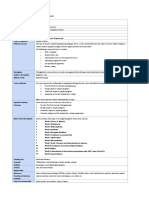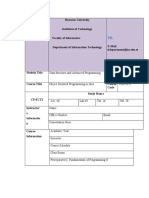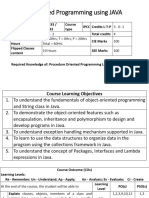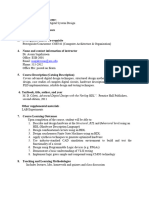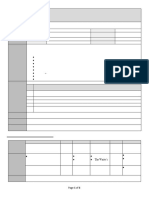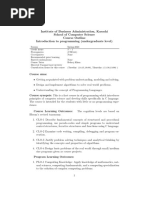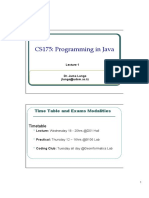EEI3262 Introduction To Object Oriented Programming - Course Synopsis
Uploaded by
prasad sandaruwanEEI3262 Introduction To Object Oriented Programming - Course Synopsis
Uploaded by
prasad sandaruwanEEI3262 Introduction to Object Oriented Programming
Level 3
Course Code EEI3262
Course Title Introduction to Object Oriented Programming
Credit value 2
Core/Optional Core
Prerequisites EEX3467(CR)
Theory Activities Independent Assessments Total
Learning hours
Hourly Breakdown 11 SSS * 2h 5 DS * 2h 4 LAB *3h=12h 11 SSS *3h = 33 h 1 CAT =1.25 h 101.25h
=22h = 10h 4 LAB-PS * 3h 4 LAB *1.5h = 6 h 4 LAB-EV * 0.5h= 2 h
= 12h 2 ONLS*1h = 2h 1 OQ =1 h
*Practical/Design/Field work/case study
Course Aim/s To write programs in Java by applying object oriented concepts with appropriate error
handling and code refactoring techniques for a given scenario.
Programme PLO1:Apply software engineering principles, tools and processes as well as fundamentals of
Learning Outcomes computer science and mathematics, to the development and maintenance of complex,
(PLO) addressed by scalable software systems.
cours
PLO3: Design systems, components or processes that meet specified needs and experiment
with prototypes.
PLO4: Create, select and apply appropriate techniques, resources and tools to software
engineering activities
PLO6: Demonstrate broad knowledge of sustainable engineering concepts and practices
required for dealing with contemporary issues related to professional practice.
PLO7: Practice engineering profession adhering to ethical responsibilities and professional
standards
PLO12: Engage in independent and lifelong learning in the broad context of technological
change.
Course Learning At the completion of this course student will be able to
Outcomes (CLO): CLO1: Explain the impact of object oriented paradigm over major programming
paradigms, object oriented principles and how object oriented programming evolved.
[PLO1][PLO12]
CLO2: Apply code refactoring techniques and naming standards to refine the source code in
written programs. [PLO1][PLO4][PLO6][PLO7][PLO12]
CLO3: Develop solutions for a given set of problems in Java using appropriate object oriented
concepts and exception handling techniques.[PLO1][PLO3][PLO4][PLO12]
Content Outline Syllabus:
(Main topics, sub
topics) Unit 1: Introduction to Object Oriented Programming
Session 1: Overview of Object Oriented Programming
Session 2: Java Programming Environment
Session 3: Data Types and Variables in Java
Session 4: Conditional and Recursions
Session 5: Objects and Classes
Session 6: Attributes, Methods and Constructors
Unit 2: Object Oriented Concepts
Session 7: Encapsulation
Session 8: Inheritance
Session 9: Polymorphism
Session 10: Refactoring, Abstraction and Reusability Mechanisms
Session 11: Errors, Exceptions handling and Debugging
Laboratory Work
1. Write simple Java programs to get familiar with Java control structures, class and method
declarations, refactoring techniques.
2. Write simple Java programs to get familiar with access specifiers, constructor, initializing an
object, instantiation of an object, message passing and mutator methods
3. Write simple Java programs to illustrate more examples with message passing,
inheritance,overriding and overloading
4. Write a console Java program to solve a given problem by applying object oriented concepts
to achieve code reuse
Teaching-Learning a) Course material in print-11 sessions;
methods Online/ Blended classes -2h
b) Compulsory contact sessions
Laboratory classes
c) Self-learning/independent learning
▪ Learning the course material (print, online)
▪ recommended reading material
▪ preparations for lab work
d) Non compulsory contact sessions
▪ Day schools (discussion classes)
▪ Lab practice sessions
Assessment Overall Continuous Assessment Mark, X Final Assessment, Y 100%
Strategy :100%
Details: Details:
Continuous Assessment Test (CAT) Final written examination, 3h (FWE)
Laboratory Work (LAB) Y = FWE, if X > 40
Online Quiz (OQ)
X =B(CAT, OQ)0.4 + AVG(LAB)0.6;
If AVG(LAB) > 40
X = 0; If AVG(LAB) < 40
Overall Assessment Mark = Z
Z=0.5X+0.5Y, if Y ≥40
Z=Y, if Y <40
Condition for Pass:
Z ≥ 40
Recommended 1. Eck, D.J., 2007. Introduction to programming using Java: version 5.0, December 2006 :
Reading (version 5.0.2, with minor corrections, November 2007), Hobart and William Smith
Colleges, Department of mathematics and computer science, Geneva (NY)
2. OER Material: Introduction to Programming Using Java, Seventh Edition, Version 7.0,
August 2014
You might also like
- University of Central Punjab: Faculty of Information TechnologyNo ratings yetUniversity of Central Punjab: Faculty of Information Technology6 pages
- Online and Blended Courses-RCS102-Object Oriented Programming 2022No ratings yetOnline and Blended Courses-RCS102-Object Oriented Programming 20222 pages
- CE505 - Object Oriented Programming With JAVANo ratings yetCE505 - Object Oriented Programming With JAVA3 pages
- SE-104 Object-Oriented Programming: Apply The Object and Their Relationships To Model & Build Object OrientedNo ratings yetSE-104 Object-Oriented Programming: Apply The Object and Their Relationships To Model & Build Object Oriented2 pages
- Chapter - 1 Introduction To Object-Oriented Programming100% (1)Chapter - 1 Introduction To Object-Oriented Programming90 pages
- CSE 122 OOP Lab OBE Based Course Outline for Spring 2023No ratings yetCSE 122 OOP Lab OBE Based Course Outline for Spring 202310 pages
- American University of Sharjah - College of Engineering: Name and Contact Information of InstructorNo ratings yetAmerican University of Sharjah - College of Engineering: Name and Contact Information of Instructor4 pages
- CSE2005_OBJECT-ORIENTED-PROGRAMMING-USING-JAVA_ETH_4.1_15_CSE2005 - Object Oriented Programming using JAVA_Revised-4.1 (B.Tech-UC)No ratings yetCSE2005_OBJECT-ORIENTED-PROGRAMMING-USING-JAVA_ETH_4.1_15_CSE2005 - Object Oriented Programming using JAVA_Revised-4.1 (B.Tech-UC)3 pages
- Course Outline for Object Oriented Programming Using C++No ratings yetCourse Outline for Object Oriented Programming Using C++5 pages
- EEB334 Computer Programming I Course Outline and Teaching Plan 2022No ratings yetEEB334 Computer Programming I Course Outline and Teaching Plan 20223 pages
- PC 101 - INFT - Program Core - Object Oriented Programming Methodology (OOPM) - Java Programing - FE - SEM 2No ratings yetPC 101 - INFT - Program Core - Object Oriented Programming Methodology (OOPM) - Java Programing - FE - SEM 26 pages
- ADP (Computing) 1st Programming Fundamental OutlineNo ratings yetADP (Computing) 1st Programming Fundamental Outline7 pages
- Course-Outline - Object Oriented ProgrammingNo ratings yetCourse-Outline - Object Oriented Programming3 pages
- National University: CS118 - Programming FundamentalsNo ratings yetNational University: CS118 - Programming Fundamentals3 pages
- WINSEMFRE2024-25_SWE2005_ETH_AP2024255000728_2025-01-28_Reference-Material-INo ratings yetWINSEMFRE2024-25_SWE2005_ETH_AP2024255000728_2025-01-28_Reference-Material-I3 pages
- Java Algorithms for Beginners: A Practical Guide with ExamplesFrom EverandJava Algorithms for Beginners: A Practical Guide with ExamplesNo ratings yet
- 2nd Lecture On Skeletal Muscle Physiology by Dr. Mudassar Ali Roomi100% (1)2nd Lecture On Skeletal Muscle Physiology by Dr. Mudassar Ali Roomi29 pages
- Impact of Social Media in The Growth of Business: A Case Study On Women EntrepreneursNo ratings yetImpact of Social Media in The Growth of Business: A Case Study On Women Entrepreneurs6 pages
- Sennheiser Rs 175 Manuale Utente (English Version)No ratings yetSennheiser Rs 175 Manuale Utente (English Version)36 pages
- Lag, Lead, Lead-Lag - Compensation in Control System100% (2)Lag, Lead, Lead-Lag - Compensation in Control System11 pages
- Name: STD: VI Div: Roll No: Date:: Ans:-RAM Stands For Random Access MemoryNo ratings yetName: STD: VI Div: Roll No: Date:: Ans:-RAM Stands For Random Access Memory3 pages
- Sessão 2 - Spencer, H - Structure, Function and Evolution, Pp. 67-92No ratings yetSessão 2 - Spencer, H - Structure, Function and Evolution, Pp. 67-9216 pages
- Composite Fabrication by Filament WindingNo ratings yetComposite Fabrication by Filament Winding26 pages
- Foundations of Library and Information Science 4th Edition Richard E. Rubin download pdf100% (1)Foundations of Library and Information Science 4th Edition Richard E. Rubin download pdf81 pages








